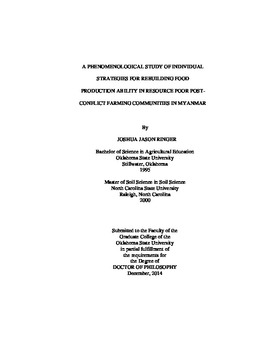| dc.contributor.advisor | Brown, Nicholas | |
| dc.contributor.author | Ringer, Joshua Jason | |
| dc.date.accessioned | 2016-01-20T15:44:54Z | |
| dc.date.available | 2016-01-20T15:44:54Z | |
| dc.date.issued | 2014-12 | |
| dc.identifier.uri | https://hdl.handle.net/11244/25710 | |
| dc.description.abstract | The impact of armed conflict upon small-holder agricultural production has only now begun to be closely studied (Verwimp, 2011). Upland communities in Southeast Asia have not been immune from armed conflict. In post-conflict or perpetual low intensity conflict situations policy makers have identified agricultural rehabilitation of small-holder food production (Christoplos, Longley, & Slaymaker, 2004) as vital for preventing economic collapse, encouraging internally displaced persons (IDPs) to return to their rural communities, and to reintegrate former insurgents into viable rural livelihoods. This issue has been studied at the regional and country level but few studies have looked at this issue from resource poor small-holder farmers' perspective (Shinn, 2010; Verwimp, Justino, & Bruck, 2007). This qualitative study documented the experience of resource-poor farmers who had experienced armed conflict in northern Shan State, Myanmar. Thirty-four resource-poor farmers and six agricultural advisors were interviewed using semi-structured interview methods. The study was conducted over a three month period in 2013. Two research questions guided the study with the first being "What are the experiences of farmers' when adapting food production systems after conflict in Northern Shan State?" and the second being "What factors influenced the experiences of farmers when adapting food production systems after conflict in Northern Shan State?" The study revealed eight themes that described the reality of the post-conflict environment and small-holder strategies to cope and recover food production capacity. The themes were, armed conflict is always with the farmers; loss of animals and seed stock; loss of local markets; forest as refuge; fear of government and militias was mitigated by family networks; large agribusiness control land and employment; prolonged conflict causes movement to safe areas and neighboring countries; rebuilding food production. These findings reveal the need for policy makers and agricultural advisory services to modify their assistance strategies and services to better match upland resource-poor farmers realities and adaptation strategies. This study affirms the reality that armed conflict will continue to be a problem for marginalized resource poor farmers. These findings point toward valuing decentralized diffusion systems that empower farmers to participate and guide their agricultural development. | |
| dc.format | application/pdf | |
| dc.language | en_US | |
| dc.rights | Copyright is held by the author who has granted the Oklahoma State University Library the non-exclusive right to share this material in its institutional repository. Contact Digital Library Services at lib-dls@okstate.edu or 405-744-9161 for the permission policy on the use, reproduction or distribution of this material. | |
| dc.title | Phenomenological study of individual strategies for rebuilding food production ability in resource poor post-conflict farming communities in Myanmar | |
| dc.contributor.committeeMember | Terry, Robert, Jr. | |
| dc.contributor.committeeMember | Watters, Craig | |
| dc.contributor.committeeMember | Sallee, Jeff | |
| osu.filename | Ringer_okstate_0664D_13774.pdf | |
| osu.accesstype | Open Access | |
| dc.type.genre | Dissertation | |
| dc.type.material | Text | |
| thesis.degree.discipline | Agricultural Education | |
| thesis.degree.grantor | Oklahoma State University | |
